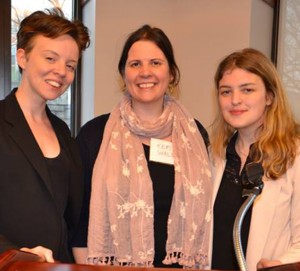Corned beef and cabbage and a pint of Guinness are just a couple of quaint images conjured in the minds of Irish Americans this time of year, while African immigration into Dublin may not be. But immigration—not emigration—is one of many contemporary issues on the minds of the Irish these days, said John Harrington, PhD, the dean of the arts and sciences faculty and interim dean of Fordham College Rose Hill.
“Everything in Ireland has changed dramatically over the last few years,” he said. “For many researchers it’s all about getting away from the Irish American myth: that whole male-focused, men-drinking stereotype.”
Under Harrington’s direction, the Institute of Irish Studies has scheduled a number of events this spring that continue to embrace tradition while busting convention.

“Many contemporary immigrant cultures address the same issues as the Irish did, and still do: Being in America, not being fully admitted, and dealing with stereotypes.”
On March 11, the institute sponsored a symposium on Irish women writers, organized by Keri Walsh, PhD, assistant professor of English.
“One of the issues of investigating a country that is heavily mythologized is not to perpetuate a cliché,” said Walsh. “So the work of women writers is great way to unpack some of these myths.”
Walsh said that even W.B. Yeats and the Lady Augusta Gregory were accused of co-opting and misrepresenting authentic Irish culture when they started the world-renowned Abbey Theater. She said later, women writers, like poet Eavan Boland and novelist Edna O’Brien, spent their careers seeking a more nuanced approach to portraying the Irish as well, by showing the ways in which certain key myths, such as that of Cathleen ni Houlihan, depended on women as a symbols, even while women were not fully included in the political life of the nation.

At the symposium, playwright Geraldine Hughes discussed her support for integrated education for Catholic and Protestant children in Northern Ireland. Author Belinda McKeon talked about the continuing challenge of writing from the viewpoint of a female protagonist in a literary tradition that has long been defined from a male point of view (her forthcoming novel, Tender, is told from the point of view of a semi-autobiographical heroine). Ora Tinsley, who has cystic fibrosis and is the author of Salty Baby, talked about her experiences growing up in the Irish healthcare system and her advocacy for people with cystic fibrosis in Ireland and beyond.
The institute will continue to shake up expectations with the Gaelic Society on March 27 at 6 p.m. when the band Celtic Cross comes to the Rose Hill campus.
Other outings and events include an April 20 production of an Eamon Grennan play based on the women in W.B. Yeats’s life and works, titled The Muse and Mr. Yeats. And on July 9 a full day symposium at the Pope Auditorium will coincide with the Druid Theatre’s Shakespeare at the Lincoln Center Summer Festival.

